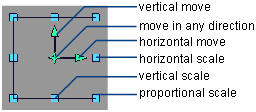Move an image plane horizontally,
vertically, or in front of or behind 3D objects, or scale it.
You can move an image
plane to change its position relative to its view. You can also
scale an image plane to change its size relative to its view. Moving
or scaling an image plane in this way changes the actual image plane
(that is, it changes the number of pixels per inch [ppi]), but it
does not change the absolute size of the image plane (measured in
pixels). This enables you to make the image plane a "real world
scale" -- for example, you can create an automobile-sized image
plane, with a defined resolution in pixels.
If you only want to change
your view of an image plane, do not move or scale it. Track or dolly
into the view instead (using  +
+  (Windows) or
(Windows) or  +
+  (Mac) with the
(Mac) with the  or
or  .
.
You can also move an
image plane so that it appears behind (background) or in front of
(foreground) the grid and 3D objects.
To move or scale an image
plane interactively (using the Move or Scale tools)
- Choose Pick > Object Types > Image Plane
 .
.
- Choose Transform > Move
 or Transform > Scale
or Transform > Scale  .
.
- Click the image plane in the view.
A manipulator appears
on the image plane.
NoteThe manipulator does
not appear if objects other than image planes are selected (for
example, surfaces).
- Drag a manipulator handle to move or
scale the image plane, or click a manipulator handle to select it
(the handle becomes white) and either:
- drag anywhere in the view
- press the arrow keys
- type the horizontal and vertical values
you want to move or scale the image plane by and press
 (Windows) or
(Windows) or  (Mac).
(Mac).
NoteChoose Edit >
Undo while the manipulator is still
active to undo the image plane transformation.
NoteIf you transform
an image plane, the transformation is applied as you drag the manipulator.
To move an image plane
horizontally or vertically (using the Camera Editor)
- Choose Windows > Editors > Cameras
to open the Camera Editor.
- At the top of the Camera
Editor, set Camera to
the view that contains the image plane you want to move.
- In the Image Planes section
of the Camera Editor, select the swatch
of the image plane you want to move.
- In the Image Plane Parameters
: Image Placement section of the Camera
Editor, set the following parameters:
- Bottom Left –
The location of the bottom left corner of the image plane (in the
main linear unit). If you set the Bottom Left X
(or Y) value, the Top Right X (or Y) value automatically
updates.
Set up for sketching
- Top Right –
The location of the top right corner of the image plane (in the
main linear unit). If you set the Top Right X
(or Y) value, the Bottom Left X (or Y) value
automatically updates.
To scale an image plane
(using the Camera Editor)
- Choose Windows > Editors > Cameras
 to open the Camera
Editors
to open the Camera
Editors
- At the top of the Camera
Editor, set Camera to
the view that contains the image plane you want to scale.
- In the Image Planes section
of the Camera Editor, select the swatch
of the image plane you want to scale.
- In the Image Plane Parameters
: Image Placement section of the Camera
Editor, set the horizontal or vertical Size value
(measured in the main linear unit) for the image plane.
If you set Image
XY Ratio Lock to ON, the image
plane is scaled proportionally when you set one of the Size values;
that is, when you set the X value, the Y value automatically updates
(and vice versa).
Set up Alias for sketching
To move an image plane
behind or in front of the grid and 3D objects
- Choose Windows > Editors > Cameras
 ❒ to open the Camera Editor window.
❒ to open the Camera Editor window.
- At the top of the Camera
Editor, set Camera to
the view that contains the image plane you want to move.
- In the Image Planes section
of the Camera Editor, select the swatch
of the image plane you want to move.
- In the Image Plane Parameters
: Image Placement section of the Camera
Editor:
- Set the Depth parameter
to Priority (ensuring that the
Priority value is a positive number) to move the image plane in
front of the grid and 3D objects.
- Set the Depth parameter
to Off, or set the Priority value
to zero or a negative number, to move the image plane behind the
grid and 3D objects.
The priority value that you assign to different
image planes also determines the order in which the image planes
appear in the view. The plane with the largest priority value appears
in front of all others, and so on.
See Windows > Editors > Cameras  for more details.
for more details.
 +
+  (Windows) or
(Windows) or  +
+  (Mac) with the
(Mac) with the  or
or  .
.
 .
.
 or Transform > Scale
or Transform > Scale  .
.

 (Windows) or
(Windows) or  (Mac).
(Mac).
 tool. To position the pivot point
in the center of the image plane, use the Transform > Local > Center Pivot
tool. To position the pivot point
in the center of the image plane, use the Transform > Local > Center Pivot  tool.
tool.
 to open the Camera
Editors
to open the Camera
Editors
 ❒ to open the Camera Editor window.
❒ to open the Camera Editor window.
 for more details.
for more details.